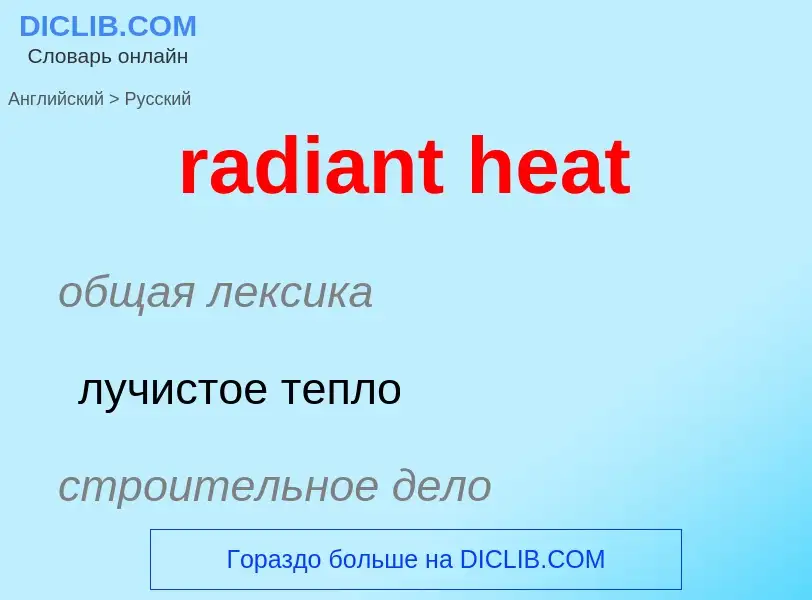Vertaling en analyse van woorden door kunstmatige intelligentie ChatGPT
Op deze pagina kunt u een gedetailleerde analyse krijgen van een woord of zin, geproduceerd met behulp van de beste kunstmatige intelligentietechnologie tot nu toe:
- hoe het woord wordt gebruikt
- gebruiksfrequentie
- het wordt vaker gebruikt in mondelinge of schriftelijke toespraken
- opties voor woordvertaling
- Gebruiksvoorbeelden (meerdere zinnen met vertaling)
- etymologie
radiant heat - vertaling naar russisch
общая лексика
лучистое тепло
строительное дело
лучистая теплота
Definitie
Wikipedia
Thermal radiation is electromagnetic radiation generated by the thermal motion of particles in matter. Thermal radiation is generated when heat from the movement of charges in the material (electrons and protons in common forms of matter) is converted to electromagnetic radiation. All matter with a temperature greater than absolute zero emits thermal radiation. At room temperature, most of the emission is in the infrared (IR) spectrum.: 73–86 Particle motion results in charge-acceleration or dipole oscillation which produces electromagnetic radiation.
Infrared radiation emitted by animals (detectable with an infrared camera) and cosmic microwave background radiation are examples of thermal radiation.
If a radiation object meets the physical characteristics of a black body in thermodynamic equilibrium, the radiation is called blackbody radiation. Planck's law describes the spectrum of blackbody radiation, which depends solely on the object's temperature. Wien's displacement law determines the most likely frequency of the emitted radiation, and the Stefan–Boltzmann law gives the radiant intensity.
Thermal radiation is also one of the fundamental mechanisms of heat transfer.

![Thermal radiation in visible light can be seen on this hot metalwork. Its emission in the [[infrared]] is invisible to the human eye. [[Infrared cameras]] are capable of capturing this infrared emission (see [[Thermography]]). Thermal radiation in visible light can be seen on this hot metalwork. Its emission in the [[infrared]] is invisible to the human eye. [[Infrared cameras]] are capable of capturing this infrared emission (see [[Thermography]]).](https://commons.wikimedia.org/wiki/Special:FilePath/Hot metalwork.jpg?width=200)
![National Research Council]], near [[Ottawa]], [[Ontario]], Canada National Research Council]], near [[Ottawa]], [[Ontario]], Canada](https://commons.wikimedia.org/wiki/Special:FilePath/Radiant heat panel nrc ottawa.jpg?width=200)

